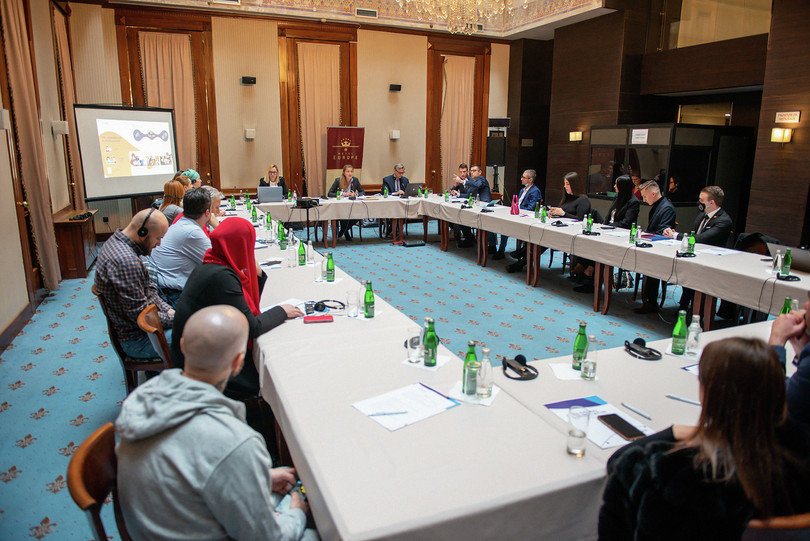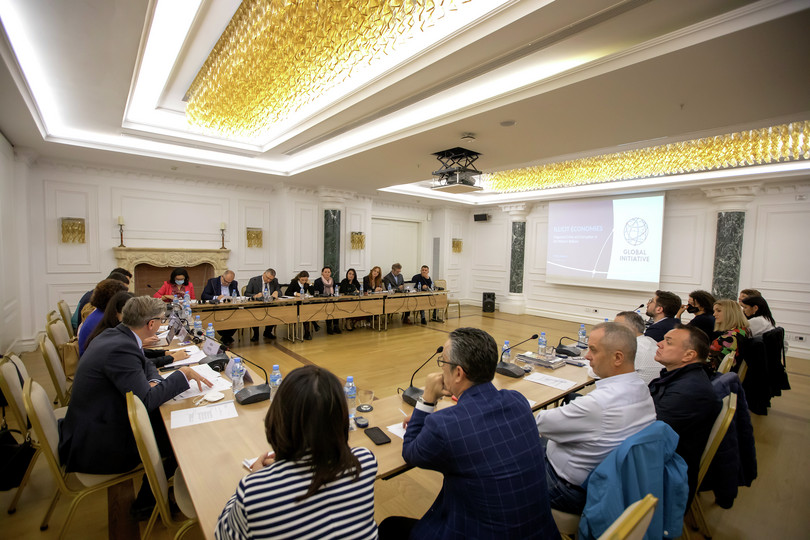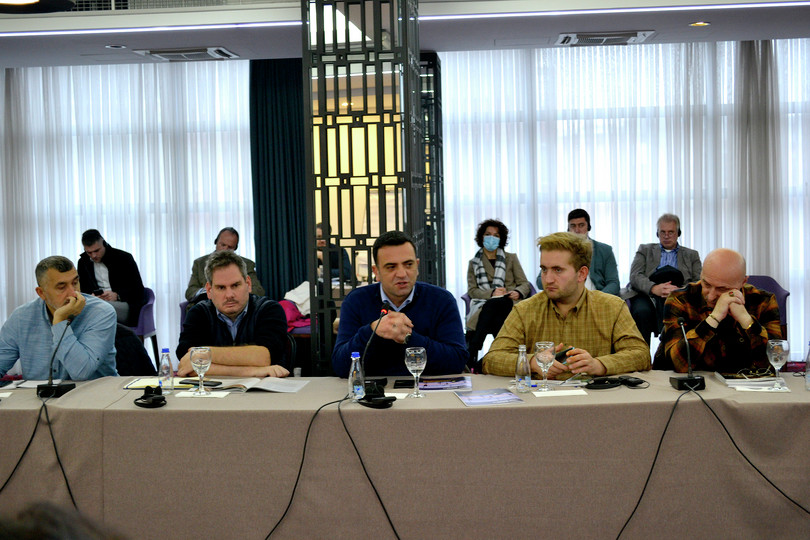Local initiatives: Resilience dialogues in the Western Balkans.
In October and November 2021, the SEE-Obs continued its series of resilience dialogues with meetings in Tirana, Belgrade, Sarajevo and Pristina. These meetings enabled the GI-TOC and its civil society partners to re-engage in person after almost two years of COVID-19, to strengthen cooperation between NGOs, investigative journalists and academics doing work on organized crime and to build bridges between civil society actors and the government in the common fight against organized crime and corruption. In each capital, the GI-TOC also held discussions with representatives of the diplomatic community, public officials and civil society to present its recent activities.
Fighting corruption in Albania
On 28 and 29 October, the resilience dialogue in Tirana, Albania, brought together civil society representatives from around the country. The meeting focused on challenges faced by youth in Albania and what CSOs are doing to reduce their vulnerability to organized crime. Among the main issues raised were the need for positive role models, alternatives to the ‘get rich quick’ narrative, the opportunities and dangers of migration, the necessity of support for small business start-ups and the impact of cannabis on some (mostly rural) communities as well as youth. Participants also shared experiences on the social re-use of assets confiscated from criminal groups. The CSO representatives, mostly women from communities outside the capital, discussed the need for civil courage and the challenges of interacting with local government, as well as the difficulties in turning short-term funded projects into sustainable long-term initiatives.

Round-table discussion during the resilience dialogue in Sarajevo, Bosnia and Herzegovina.
Photo: Bahrudin Bandic
The meeting also touched on how to build bridges between CSOs and the government in preventing and combating corruption. Opening remarks from Adea Pirdeni, Deputy Minister of Justice, and Jorida Tabaku, Chairperson of the National Integration Council and of the parliamentary committee on European integration, were followed by a discussion on how to strengthen a culture of integrity in public institutions and the private sector; how to increase public awareness of the impact of corruption; the need to involve civil society in the drafting and implementation of anti-corruption laws and strategies; and how to maintain the ‘watchdog’ function of anti-corruption CSOs while still having the government consider them as constructive partners.
Among the issues raised were corruption in the media and the need for more effective whistle-blower protection as well as a more independent anti-corruption body. The deputy minister and CSO representatives thanked the GI-TOC for convening the meeting, which they saw as a rare and necessary step in enhancing dialogue and trust between civil society and the government on preventing and combating corruption.
In a meeting with a wider audience, the SEE-Obs invited Albanian journalists to share their experiences investigating the activities of Albanian organized crime groups operating in the country and abroad. Information on the modalities of cocaine trafficking from Latin America to Europe was particularly revealing. Among the points raised in the subsequent discussion were the difficulties in accessing information; the protection provided to some criminals by public officials; the lack of high-level prosecutions for serious organized crime; the vulnerability of impressionable youth to organized crime (including glamourization of crime and deviant role models in social media); and the dearth of in-depth investigative reporting in the field compared to superficial discussions about organized crime in television studios.
CSOs as service providers in Serbia
The resilience dialogue in Belgrade, Serbia, held on 4 and 5 November, also brought together CSO representatives from around the country and focused on the role of CSOs in supporting drug users; post-penal reform; and youth who are vulnerable to organized crime. Other topics included loan sharking, football hooliganism, illicit financial flows, trafficking in human beings and the impact of corruption and criminal groups on local and central government.
A number of participants noted the difficulties faced by CSOs in Serbia, including lack of access to information, limited resources, lack of communication with local government officials, confusion caused by government-organized NGOs, a hesitancy by donors and civil society to address issues of organized crime and even harassment and lawfare against CSOs.
That said, in a session involving a limited number of public officials, good cooperation was noted between CSOs and the government on issues relating to drug treatment and post-penal reform. Public officials acknowledged the added value of CSOs as service providers in the communities where they are active. However, there was less acceptance of CSOs working on issues related to organized crime or calling out corruption.
In the public session, SEE-Obs representatives underlined the need to promote more debate and analysis of issues related to organized crime and corruption as well as more constructive engagement between the government and civil society. It was noted that CSOs can be an important ‘corrective factor’ to government policies and can propose solutions to improve the situation.
Focusing on migration in Bosnia and Herzegovina
The resilience dialogue held in Sarajevo, Bosnia and Herzegovina, on 15 and 16 November, included CSO representatives from the Federation of Bosnia and Herzegovina and Republic of Srpska as well as Brcko District. NGOs representing the police also participated. As in other capitals, civil society representatives were critical of the lack of access to information, limited resources and limited opportunities for engagement with public officials. They also noted that cooperation against organized crime was hindered by the polarized political situation in the country and the multi-layered system of government.
Among the points raised was the need for more active participation of young people on issues related to raising awareness of the harms of organized crime and corruption; greater support for investigative journalism; and more opportunities for communication between CSOs and public institutions, for example concerning information and support for drug users and migrants.
A discussion was held on the topic of building bridges between the government and civil society to deal more effectively with the challenge of migration in Bosnia and Herzegovina. Civil society representatives from one of the most affected regions, Una-Sana canton, close to the border with Croatia, detailed the dire humanitarian situation faced by people on the move. Public officials, including members of the border police, described the challenges that they face in dealing with the issue, including insufficient cooperation with some neighbouring countries and the international community, and insufficient resources and corruption at border crossings. Nevertheless, it was noted that the number of mixed migrants in Bosnia and Herzegovina decreased in 2021. Participants also discussed human trafficking in the country, including the vulnerability of migrants to exploitation for sex or forced labour.
Participants appreciated the opportunity to meet and have a constructive exchange of views, and discussed ideas for possible future cooperation. Although they emphasized the importance of civil society maintaining its independence, they agreed that on issues such as drugs, migration and corruption, civil society organizations and public officials ‘have the same goal’.
While in Sarajevo, GI-TOC staff met with the country’s minister of security, the head of the political department of the Regional Cooperation Council and the senior anti-corruption advisor at the Regional Anti-Corruption Initiative.
Strengthening anti-crime coalitions in Kosovo
The fifth resilience dialogue took place in Pristina, Kosovo, on 25 and 26 November. The main focus of the meeting was how to build coalitions and develop narratives in the fight against organized crime and corruption. The meeting brought together a diverse group of participants from around the country – investigative journalists, experts from think tanks and activists from grass-roots organizations.
Participants emphasized that the media needs to focus more attention on organized crime in Kosovo, beyond covering issues such as bribery and the lack of transparency in public procurement processes. Journalists were encouraged to cover organized crime groups operating in Kosovo and criminal markets such as trafficking in drugs and counterfeit goods as well as environmental crime. A number of participants agreed that Kosovo should develop its own discourse on organized crime, rather than just looking at the problem in neighbouring countries like Albania or Serbia. They also stressed that more attention should be devoted to organized criminal groups from Kosovo operating abroad.
Participants discussed ways to strengthen the relationship between the media and NGOs. It was noted, for example, that if journalists focus more on organized crime and corruption, NGOs should better promote their work and increase pressure on the government to take action on the findings revealed in investigative reporting.
In a meeting with public-sector officials, CSO representatives had a rare opportunity to interact with the deputy minister of justice, a member of the anti-organized crime police and a representative of the national anti-corruption agency, as well as a whistle-blower. Participants discussed their challenges in dealing with organized crime and corruption, and engaged in a constructive dialogue on improving accountability and transparency in the public sector and fostering greater cooperation between the public sector and society at large.
Working towards a resilient Balkans
These dialogues revealed the challenges faced by CSOs working on issues of organized crime and corruption, many of which have been compounded by COVID-19. But they also underlined the courageous and dedicated work that CSOs do in their communities. The meetings reinforced the need to build bridges between civil society and the government and to work collaboratively towards a common goal. Participants discussed potential follow-up activities after the dialogues.
During the resilience dialogues, three recurrent themes came up: youth, gender and the social re-use of stolen assets. As a follow up to the Observatory’s February 2021 report ‘Stronger together: Bolstering resilience among civil society in the Western Balkans’, the SEE-Obs will publish thematic reports on these topics in early 2022 as part of a new series entitled ‘Resilient Balkans’.


Resilience dialogues in the Western Balkans revealed challenges faced by CSOs working to counter organized crime and corruption.
